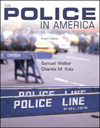 |  The Police in America, 4/e Samuel Walker,
University of Nebraska
Charles M. Katz,
Arizona State University-West
Police Work Innovations in Policing
Chapter Overview| Research undermining the assumptions of traditional management and reform and the community relations crisis of the 1960s are a couple of factors that prompted change in American policing. Referring to what was sometimes known as the "new era" in policing, this chapter provides an in-depth examination of the roots and elements of community policing and problem-oriented policing. Included in the analysis is a discussion of the "broken windows" hypothesis, an influential theory that provided a basis for the community policing philosophy.
Several studies which have applied both community policing and problem-oriented policing practices are reviewed, including one of the most ambitious community policing efforts to date: the Chicago's Alternative Policing Strategy (CAPS) program. The chapter concludes with an examination of the effectiveness of and problems associated with zero-tolerance policing. |
|



 2002 McGraw-Hill Higher Education
2002 McGraw-Hill Higher Education